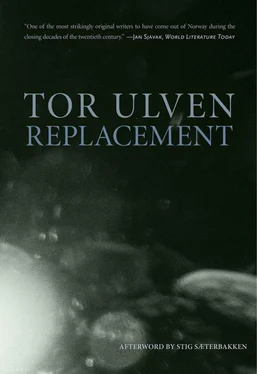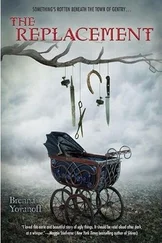Now, standing here listening to the thunder pealing outside, as you set down the X-ray and rub your tired eyes, you wonder what would’ve happened, or better yet, what wouldn’t have happened, if for some idiotic reason or other you hadn’t been brave enough to see the lie through, to repeat what you’d just said in a firmer voice: you wouldn’t have gotten to know her; simply put, you would’ve led another life; and you shudder, a shudder mixed with a strange, bitter joy, as you contemplate the extraordinary implications a few chance words can have, how a brief succession of syllables can become the slender strand of spider web holding up a whole theater, a theater, namely, with an empty stage, where soon you’ll both appear, each from your own wing, pause, and look each other in the eye.
Socially speaking, a borderland, or a no-man’s-land, neither the so-called good nor the so-called bad part of town, probably an area populated by social climbers hoping to get a firm foothold in the upper class (or, conversely, a stopover for the debt-ridden, the bankrupt, embarking upon a slow, ruthless migration down to the lower class?). Humble or modestly ambitious one- or two-story houses (their freshly manicured lawns occasionally decorated with sundry knickknacks, like yellow sundials, red wheelbarrows, big iron flowerpots overflowing with marigolds, small basins ringed by statuettes (which show that the owner has missed the mark in terms of the traditional, solid, respectable bourgeois taste he was no doubt aiming for), and, less often, a functional, rectangular swimming pool, whose shape gives it no-nonsense, down-to-business kind of air), houses, that is, interspersed with condos, multi-family homes, as well as small, isolated apartment buildings. It wouldn’t hurt to climb out of the taxi along with her, you decided with studied nonchalance (though you had no idea where exactly you were, just that it was one of those in-between places that was neither east side nor west side). As you stood in front of her door, she hadn’t tried to shield you with her umbrella, she hadn’t even opened it (though the rain was still pouring down), though she hadn’t hurried inside either; she’d just paused uncertainly as she looked you up and down a few times (or acted like she was examining you when maybe she’d already decided?; it’s only now, as you’re absentmindedly glancing from X-ray to the window, toward the lightning’s incessant phantasmagoria outside, that you realize you’d forgotten to ask her since), and, finally, she said Do you have far to go, and you said something like Hmm, Not really, or Yeah, a ways yet.
Luckily (or with halfway conscious premeditation?) you hadn’t sat in the chair across the table from her, that table which could have acted like a barricade, impossible to get around. When there are only two people in a room (two strangers, one of each sex, that is), it can be extremely hard to change seats. And the night, the lightning, the thunder, the rain, the sound of the rain on the tile roof of the building in which she had an apartment, compelled you to speak low, so low you were almost whispering, and it was only after the storm had (presumably) been over for a while that you finally noticed the light blue sky and the low if intense summer-morning — or rather, late-summer-morning — sun outside. And wasn’t it the shadow of that old-fashioned transom window that cast that shape, not across the floor, but upon the far wall, you think, and you’d spread your fingers and let the shadow of your hand move toward the cross in the middle, and just for the fun of it, she spread her fingers and let the shadow of her hand move toward the cross as well, though from the opposite direction, until the shadows of your hands conjoined and vanished there, as if they were meeting in secret, as if some unrecognized part of you had met some unrecognized part of her in some covert, hidden place, in some meeting place neither of you knew about, and that neither of you could know about, because there in the morning sun you didn’t even know each other; perhaps that’s the best stage, you think, absentmindedly glancing at the X-rays of your young skeleton, perhaps that’s the best of all stages when you’re falling in love: the stage, that is, where everything is still a cascade of unrealized potential, like when you’re standing outside an enormous amusement park of silence (just the distant sound of an orchestra tuning their instruments from somewhere beyond the trees), and you close your eyes and sigh in expectation, standing there before the main gate, where lightbulbs gleam brightly against the dark, before you go inside, where the few attractions will just become noisier and noisier, more and more vulgar, as the jostling crowd grows ever larger, the hawkers bolder, the entertainment simpler, the colors gaudier, the make-up shoddier, and the prices steadily higher, so that you’re shelling out more and more money for less and less fun, until your recreation becomes a nightmare, as though these fancy, traditional firework displays were going off inside a prison cell; or the exact opposite, it could well be the opposite, you think, the music dying down to a hesitant diminuendo, the Ferris wheel coming to a stop, until there are no more screams from the roller coaster, there is no more water for the squirt guns, no more electricity for the bumper cars, until even the haunted house is closed, unable to terrify anyone, and the gravel paths are completely deserted. Finally, the gleaming lightbulbs and the fantastic displays go out, one by one, until the miraculous wonderland lies empty and abandoned, and the leaves begin to fall, suddenly it’s autumn, then the frost comes, it’s winter now, it’s snowing, the amusement park is buried in snow, covered in darkness and buried in snow, until the snow is the only thing left gleaming.
You don’t say it, you only think it, because there’s no one to say it to, and anyway, it’d just sound pathetic, sentimental, self-pitying (because it implies that you haven’t been happy since then (and you haven’t been, not really, but that wouldn’t exactly make for sparkling conversation), since you broke up, that is, that you’re unhappy, that you’re complaining), it’d just sound like a line from those tearjerkers women love, like an obscure novel from another century, but you can at least say the words to yourself, and you do, and you wonder how many people out there are doing the same thing, how many people out there are saying to themselves or rather thinking to themselves those unbelievable words, Back then I was happy, and it never occurs to them (to the others, that is, to those people who are happy now, or who have never been happy, or been neither happy nor unhappy?) that it could happen like this, that for a (short) time you could be happy, and then not happy; it never occurs to them because the very idea is sinful, a thought so terrible that if they were church fathers (and perhaps they are, in a way), they would’ve declared it to be the eighth deadly sin, right up there with Pride, Envy, Wrath, Sloth, Greed, Gluttony and Lust — you’re talking about Nostalgia; that’s it, you think (to yourself, always to yourself), because those are the people who are going to build their hopes in the Future; a future, oddly enough, that they regard in nostalgic terms, because it’s something they yearn for, they yearn and yearn, it’s something they’re actively working to produce in a pleasant, large, though not overly large, happiness factory, the wheels are already running smoothly, therefore there’s no point in looking back, there’s just a compost heap of bygone days, days which to them are nothing but junk, rubbish, shit, good for nothing but fertilizing the ground from which their glorious future will spring. The Future. By definition, the future must contain everything good, because if you can’t be happy in the future, but only for a short time in the past, what’s the point of keeping the wheels spinning? what’s there to strive for? why bother whistling while you work up such a sweat? what happens to the idea that you’re building your own happiness? what happens to productivity? to the cheerful hum of productivity? to the sound of your good luck coming home to roost? It’d all go to hell in a handbasket, that’s what. As long as you only talk about it to yourself, though, and only to yourself, you’re welcome to stand around and remember.
Читать дальше












